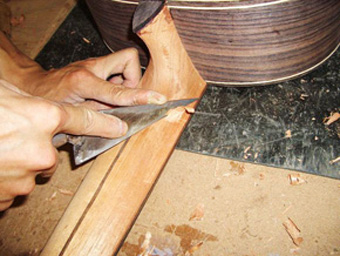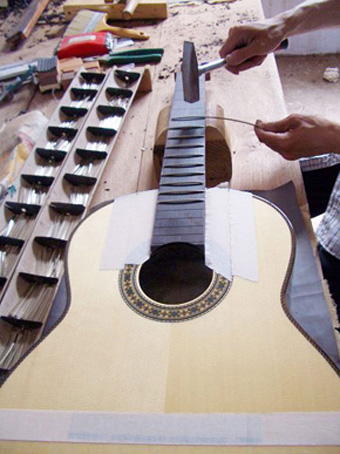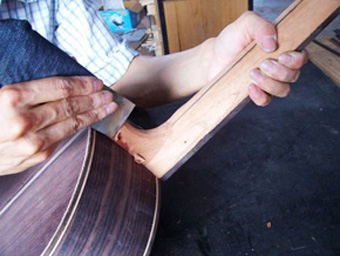All classical guitars are hands-made in the sense that human hands are involved in the construction and assembly process.
The difference between a “factory guitar” and a “luthier-made” guitar is the amount of time involved in the “fine tuning” aspects of the production process. Even world-famous luthiers use “machinery” in the production process, such as routers, band saws, power sanders, joiners and the like. Most world-famous luthiers do not do all the work themselves, but assign some of the “less important” tasks to apprentices and assistants in their shops.
High-end “hands-made” factory guitars often sound better than many so-called “luthier-made” guitars. Not all luthiers are equal with regard to their experience and abilities.
The process of automating the procedures in a factory setting insures that the quality is consistent from one individual piece to another. The only way to efficiently produce a quality instrument in the $200 to $2,000 price range is to automate as much of the process as possible and locate the production facilities in a country where wages are low. In the lower price ranges, the cost of the materials is also a major factor. Here, the factories have the advantage of buying power, because they purchase their materials in larger quantities than individual luthiers.
Once you start moving into the higher-end guitars, in the $5,000 to $20,000 range and up, the labor costs go way up, while the cost of materials remains the same, for the most part.
Various guitar parts, especially the tops and bracing, are individually and expertly tuned, and great time and effort go into the finishes and the finishing process. This is the point at which the manufacturing process turns into a fine art, and most of the “hands-on” work is personally done by the “master luthiers” themselves. Some luthiers do 100% of the production work personally, while others assign much of the less demanding work to highly-skilled helpers.
All guitars that carry the Goyette name are hands-made, some in an automated factory setting, and some in the shops of master luthiers who do most of the work themselves.
When you get into the $2,000 price range, the work is done by highly-skilled assistants very closely supervised by a master luthier.
The Goyette Grand Concert Models, which sell for about $2,200, are produced in the shop of the world-famous Yulong Guo, China’s premier luthier.
These models include the Flamenco, Grand Concert and Hauser models, and they are produced in Mr. Guo’s shop, but not by his personal hands. The Chamber Concert and Concert Models are produced mostly by Mr. Guo himself and bear his name and signature.
What is it that makes the Goyette and Yulong Guo guitars so special?
I would say “quality” and “price.” I buy direct from the lutheries in China where labor costs are very low. Also, there are no “middle men.” There are no import companies involved, and no other intermediaries that need to be paid, such as national and regional distributors, and retail stores with high overhead expenses. I work from my home with little or no overhead expenses. I personally inspect and set-up each instrument, and sell directly to the buyer. For this reason, Goyette and Yulong Guo guitars compare favorably with other guitars costing much more.




